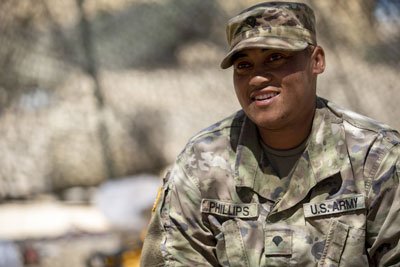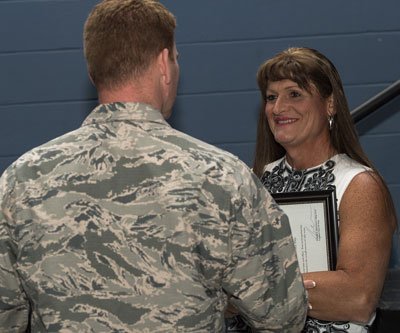Transgender Troops, Vets Warned to Avoid Florida Over Discriminatory Laws
When Jodi Jeloudov walked into the West Palm Beach Veterans Affairs center for her monthly doctor’s appointment this summer, she felt on edge. For eight years, she had approached VA the same way: high heels clipping the pavement, makeup adorning her face.
As a transgender veteran, she faces persecution and harassment every time she visits, she tells The War Horse.
After she left the appointment, Jeloudov stopped to use the women’s restroom. VA employees spotted her, removed her, and questioned her.
For Jeloudov, the situation was hardly new. But this time, she recorded it.
The video shows two VA employees referring to Jeloudov as a man. One mentions a supervisor who saw Jeloudov approach the bathroom who “didn’t want to get in trouble.”

Jodi Jeloudov, a U.S. Army veteran and transgender woman, videotaped Veterans Affairs employees in Florida who refused to allow her to use the women’s bathroom, saying Florida law says she must use her birth-assigned-gender bathroom. VA officials say federal rules overrule Florida rules and Jeloudov should have been allowed to use the women’s bathroom. Photo courtesy of Jodi Jeloudov.
“I’m calling an officer up here so they can explain it to you,” another employee tells her. “Here at the government—I understand your situation—but if you [were] born a man, you have to go to the men’s bathroom. We can’t let you go to the ladies’ bathroom because what if a lady [walked] in there and [saw] you in there?”
“It’s illegal,” the first VA employee says.
Jeloudov joined the Army more than a decade ago. VA pledges to “care for those ‘who shall have borne the battle’ and for their families, caregivers, and survivors.” But based on experiences like this, Jeloudov expects the opposite at her local care facility, she says.
Jeloudov is transgender. “Transgender” refers to people whose gender identity does not correspond to the sex they were assigned at birth.
She is also a veteran.
In Florida, the former outweighs her service.
In response to incidents like Jeloudov’s, SPARTA, an advocacy group that supports transgender service members and veterans, released a warning to transgender service members to avoid Florida.
“SPARTA has withheld such recommendations previously, recognizing service members can fulfill their duties anywhere in the world,” the warning states. “They have done so proudly for over 200 years and continue to do so in duty stations worldwide and ships sailing all the world’s oceans. However, here at home, the state of Florida has created circumstances that pose legal challenges and hazards to our nation’s military members, even while they defend our nation’s freedoms.”
The warning raises questions about how transgender military members can serve while their identities are under scrutiny. Florida is home to almost two dozen military bases and installations, with more than 60,000 active members serving in the state, according to a March 2023 Department of Defense report. For transgender service members, the likelihood of being stationed in Florida is a tangible reality, with limited options to avoid it.
In 2022, the Florida State Senate passed a bill critics call the “Don’t Say Gay” bill, which limits how public schools address queer issues or topics. A year later, transgender citizens cannot use public bathrooms, access to gender-affirming care for trans youth has been criminalized, and drag performances have been banned if minors are present.
(The American Academy of Pediatrics reaffirmed on Aug. 4 its position about the need for gender-affirming care, stating, “The AAP opposes any laws or regulations that discriminate against transgender and gender-diverse individuals, or that interfere in the doctor-patient relationship.”)

U.S. Army Reserve Spc. Leo Phillips, a water treatment specialist assigned to the 968th Quartermaster Company based in Tustin, California, shares his story as a transgender soldier during the Quartermaster Liquid Logistics Exercise at Camp Pendleton in 2022. Photo by Sgt. Joseph Black, courtesy of the U.S. Army Reserve.
As Florida continues to implement anti-transgender legislation, and as an increasingly volatile political climate infiltrates even the most apolitical spaces, veterans like Jeloudov feel traumatized, they say.
“The last eight years, nothing happened,” Jeloudov tells The War Horse. “Harassment continues unabated. Veterans continue to die of suicide.”
Transgender service members enlist at twice the rate of their cisgender counterparts. They are also twice as likely to die by suicide, according to a 2019 study published in Perspectives on Psychological Science. And transgender veterans are disproportionately more likely to experience homelessness, sexual assault, depression, and post-traumatic stress disorder.
Although military policies are designed to protect transgender service members and veterans, the line between state and federal law has become blurred. VA falls under federal law, which ensures that transgender veterans may use the bathroom of their gender identity and that employees refer to them by their designated names and pronouns. But the staff at the West Palm Beach VA in the video defer to newly passed state legislation that states otherwise.
“Recently, [the employees] were invoking, saying that this [is] DeSantis’ law, Florida state law,” Jeloudov says.
West Palm Beach VA officials couldn’t comment about the employees Jeloudov encountered, they said in a statement provided to The War Horse. But, the “incident was addressed promptly, resulting in additional staff training to ensure veterans of all gender identities know that, whenever they walk into our facilities, that they will be treated with the care, compassion, and respect that they deserve,” they said.
They also clarified that VA operates based on federal policy and not state legislation.
“This is unacceptable, and senior VA officials, as well as local employees, have reached out to this veteran to apologize,” VA press secretary Terrence Hayes told The War Horse. “Since this incident, senior VA leadership have engaged with local leaders, and we have conducted additional staff training to ensure that this does not happen again.”
‘It Becomes a National Security Issue’
Continued targeting of transgender service members and their families distracts from imminent security threats, says Alleria Stanley, the communications director for SPARTA.
“It has an effect on readiness, it has an effect on military capability, it has an effect on mission performance,” she says. “If you’re worried for your safety—if you’re at work, wondering if your child will be attacked at home or if your home will be burned down when you’re gone, or if you’re going to be able to go to the bathroom, or any of these laws—it’s going to be very difficult to perform [the] mission that you need to, and so that’s a liability.
“In effect, it becomes [a] national security issue.”

Sailors and Marines receive transgender training aboard the amphibious assault ship USS Bataan from Ingrid Smith, a deployed resiliency counselor, in the ship’s classroom. Photo by Mass Communication Spc. 3rd Class Caleb Strong, courtesy of the U.S. Navy.
When Stanley joined the Army in 2003, she hid her transgender identity because of “don’t ask, don’t tell,” a policy implemented by former President Bill Clinton in 1993. While the policy overturned an outright ban against LGBTQ+ service members, it allowed the military to discharge service members who were discovered as gay—perpetuating a wall of silence and fear for LGBTQ+ military personnel.
While the Obama administration repealed the policy in 2010, transgender service members were still subject to discharge if they publicly came out. It wasn’t until six years later that transgender service members, such as Stanley, were allowed to serve openly and authentically.
In 2017, however, transgender service members were suddenly “fired by tweet” when former President Donald Trump posted that “our military must be focused on decisive and overwhelming … victory and cannot be burdened with the tremendous medical costs and disruption that transgender in the military would entail.”
In an instant, security for transgender military members vanished. The Trump administration proposed a policy revoking open and affirming protocols for active service personnel, as well as banning the military from providing gender-affirming healthcare. The policy was blocked and then revoked by the Biden administration in 2021.
“Everything’s over,” Stanley says, expressing sarcasm. “It’s fantastic, the nightmare is over.”
“Obviously not,” she continues, “as we are seeing, and the newest struggle is manifesting itself here at home.”
New legislation in Florida has left Stanley and others in a state of fear. The only thing protecting transgender service members’ ability to serve openly is an executive order—an order that can easily disappear under new administrations.
Award-Winning Journalism in Your Inbox
In February, Sen. Marco Rubio, a Republican from Florida, introduced legislation that would reinstate Trump-era policies banning transgender people from serving in the armed forces. The bill, which still awaits a vote, specifically targets service members who have been diagnosed with gender dysphoria and publicly identify as transgender.
“Biden has turned our military into a woke social experiment,” Rubio said in a press release. “It is a stupid way to go about protecting our nation. We need to spend more time thinking about how to counter threats like China, Russia, and North Korea, and less time thinking about pronouns.”
‘I Instantly Felt Betrayed’
As SPARTA received reports from service members and veterans in Florida, Stanley closely monitored the wave of legislation as it passed. She declined to speak about the specifics of her constituents’ experiences, fearful that details could put them at risk, or worse, in immediate danger.
For Jeloudov, the perceived risks are a daily reality. Upon posting her video from VA, she was met with hate on social media, and she eventually turned the comments off.
Fearful that her access to gender-affirming healthcare at VA could be limited or denied, Jeloudov looked for civilian options in the area. But under a Florida law signed in May, health care providers can refuse treatment for patients based on “conscience-based objections,” defined as “a sincerely held religious, moral, or ethical belief.”
Lindsay Church worries that community care providers in Florida will refuse to treat transgender patients, despite being contracted through VA, she says. Church serves as the co-founder and executive director of Minority Veterans of America, a nonprofit that supports minority veteran communities.

Retired U.S. Air Force Maj. Laura Perry, 45th Medical Operations Squadron master social worker, talks with an attendee after a speaking engagement in 2016 at Moody Air Force Base, Georgia. Perry was instrumental in the fight for transgender military members to openly serve, and she travels the country sharing her story. Photo by Airman 1st Class Janiqua P. Robinson, courtesy of the U.S. Air Force.
“If we have community care through VA, which is a program that we use regularly to gain access to care in our communities, are those community care providers able to provide services like abortion [or] gender-affirming care?” Church says.
Jeloudov has an answer: no.
Worried that VA will halt her prescription, unable to move away from Florida, and understanding the second-closest VA is four hours away in Miami, Jeloudov had to consider hormone treatment from other sources, she says. Since community health care providers can now refuse to care for her, she has few options.
“There’s nowhere else to go,” she says. “We need to really drive out to West Inland to some shady clinic. You don’t know where those hormones came from. They say it’s estrogen, but you don’t know where they came from. But … I need to take those in order to feel happy, to feel better.”
Fiona Rawls, a former U.S. Army staff sergeant and a transgender veteran, responded to Jeloudov’s video with testimony of her own, recounting how she, too, had experienced discrimination and harassment.
“When I saw [the video], I instantly felt betrayed,” she says. “This is my VA facility where I was personally mistreated.”
‘Life Becomes Untenable’
Carl Charles, a senior attorney with the South Regional Office for Lambda Legal, finds the situation in Florida troubling.
“Previously, where the climate was one of acceptance and lack of tolerance for discrimination, harassment, and violence against LGBT people, folks knew to not feel empowered to be disrespectful, to be hostile. And now, unfortunately, that is changing for the worse.”
Lambda Legal is a nonprofit organization that assists LGBTQ+ individuals with discrimination cases.
Charles helped litigate the Karnoski v. Trump case, which challenged the constitutionality of the Trump administration’s policy to ban transgender service members from the military, and which was eventually closed when President Biden took office. In his mind, the exclusion of groups from the nation’s largest employer of transgender people only serves to embolden further ostracization by private institutions.
On June 21, Lambda Legal applauded the reintroduction of the Equality Act—a federal policy that would codify anti-discrimination laws for LGBTQ+ people—by Rep. Mark Takano, a Democrat from California, and Sen. Jeff Merkley, a Democrat from Oregon, citing the danger community members have faced in the past year.
“In a year when we have seen unprecedented, coordinated attacks by states on LGBTQ+ people, especially on transgender and nonbinary youth, the need for the Equality Act could not be clearer,” Lambda Legal CEO Kevin Jennings said in the statement. “The LGBTQ+ community has been asking Congress for explicit protections since Reps. Bella Abzug (D-NY) and Ed Koch (D-NY) first introduced the Equality Act of 1974, 49 years ago, and nearly 50 years of waiting for federal action is long enough.”

Army veteran Jodi Jeloudov poses for a picture dressed as she usually does when she visits her local Florida Veterans Affairs health facility. SPARTA, an advocacy group that supports transgender troops and veterans, recently issued a warning asking transgender veterans and service members to avoid Florida because of “challenges and legal hazards” they face there. Photo courtesy of Jodi Jeloudov.
Church cited the importance of transgender service members’ impact when recruitment is down, as it is now. One in five transgender people will serve in the military, with nearly 15,000 active and reserve troops already serving, according to a 2018 study. As an ever-growing demographic, the lack of protections only works to weaken the military as a whole, Church says.
“You can’t be military and veteran-friendly unless you’re friendly to all military veterans in our country,” Church says. “You can’t pick and choose which military veterans and service members you want to support. We give our lives to this country and we shouldn’t be faced with these types of laws.”
For Stanley, as Florida and other states adopt similar legislation, it threatens more than health care, bathrooms, or social acceptance: It represents a systematic eradication of transgender visibility.
“Life becomes untenable—just everyday life,” she says. “For our service persons who swore to uphold those freedoms to preserve, protect, and defend the very Constitution, it is heartbreaking to then be challenged by being denied those freedoms.”
‘You Have to Call Out These Things’
Arkansas Gov. Sarah Huckabee Sanders banned transgender public school students from using the bathroom of their gender identity in March. Oklahoma followed close behind in May, making it a felony to provide transgender care for minors. In early June, Gov. Greg Abbot barred transgender youth from accessing gender-affirming care in Texas, and Vanderbilt University Medical Center in Tennessee recently provided the state attorney general with medical records of their transgender patients for a probe into possible billing fraud.
Military families with trans children say the issue has already affected where they feel safe being based.
But VA officials say the laws won’t affect their clients—at least under this administration.
Our Journalism Depends on Your Support
“VA’s policy (outlined here) is that veterans are welcome to use any and all facilities that correspond to their self-identified gender identity,” Hayes says. “Moreover, it’s our job at VA to make sure that veterans of all gender identities know that whenever they walk into a VA facility, they will be treated with the care, compassion, and respect that they deserve. That is the standard to which we hold all VA employees. This incident was a failure of that mission, and we will not rest until it is fixed—for this veteran and for all veterans who entrust us with their care.”
Jeloudov says she is skeptical of VA’s commitments and apologies. Her fellow transgender veterans often come to her for help, citing experiences similar to what she caught on video. She describes the fear that has overtaken her community:
“[People] do want to stand up,” she says. “But when they see the obstacles, and there’s many—the discrimination, the threats, the blackmail, the intimidation, the bullying—I’d say 90% of people, they don’t want to face it because they will lose something valuable to them.”
She wants a simple life—a life free from the torments of her experiences, spending time with her cats and her films, she says. She worries for her family in Ukraine, and the health and safety of her fellow transgender veterans. She feels discredited, alone, and vulnerable, she says. Despite it, she felt compelled to use her voice.
“I’m not [silent] because you have to call out these things,” she says. “That’s what I believe.”
This War Horse feature was reported by Eden Stratton, edited by Kelly Kennedy, fact-checked by Jasper Lo and Jess Rohan, and copy-edited by Mitchell Hansen-Dewar. Headlines are by Abbie Bennett.





Comments are closed.